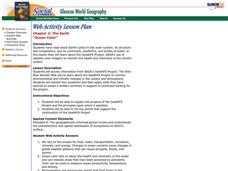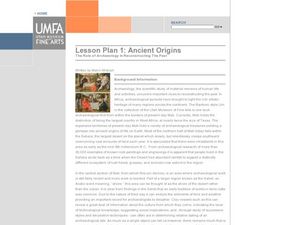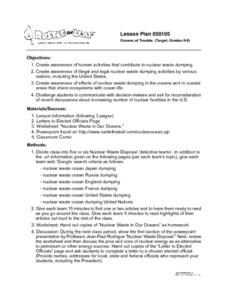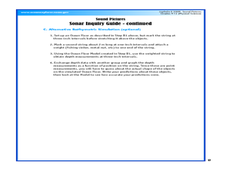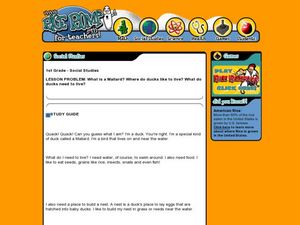Curated OER
Who Has the Data? Monitoring Coral Reefs
Students access data to characterize coral reefs. In this scientific research lesson plan, students access data and explain the need for such data when monitoring coral reefs. They will identify and explain three major threats to coral...
Curated OER
Pollution Solution
Young scholars explore the topic of oil pollution and how it affects the global ocean. They discuss oil spills in recent history and use problem solving skills to decide what strategies could be used to actually clean up an oil spill....
Curated OER
Ocean Color
Students examine NASA's SeaWiFS Project Web site to explore how the SeaWiFS Project monitors environmental and climatic changes in the oceans and atmosphere. They answer questions and write a summary in support of continued funding for...
Curated OER
Fish Are Animals Too
Young scholars create posters that show how a shark is a major predator in kelp forests and coral reefs after studying the food webs for these ecosystems. They determine that fish are important animals in the ocean's web of life.
Curated OER
Biodiversity
Students explore the biodiversity of the national marine sanctuaries. In this science lesson, students view a video about Cordell Bank National Marine Sanctuary and Hawaiian Islands Humpback Whale National Marine Sanctuary. Students work...
Curated OER
Horrific Hurricanes
Students study hurricanes and how scientists predict them. In this hurricane lesson students read an article on hurricanes, complete an activity and take a quiz.
Curated OER
Go Fish!
Students are introduced to the culture of the Kumeyaay. Using their text, they discover how they used their native flora and fauna in San Diego. They participate in a matching game and examine the types of organisms who make their home...
Curated OER
Food Web
Young scholars are able to define food web, and identify the interdependence of organisms within a system. They are able to describe how natural events and human activities can impact a food web.
Curated OER
Ancient Origins: The Role of Archaeology in Reconstructing the Past
Learners read information about the ancient origins of art and archaeology with a focus on the Malian culture. In this art origins lesson, students read background information for the topic and compare ancient and contemporary objects....
Curated OER
Watersheds and Wetlands
Students discuss the idea of a watershed. They build models of watersheds using paper and observe what happens to their models when it "rains". In addition, they build a second watershed to compare watersheds with wetlands to those without.
Curated OER
Fish Fashion 101
Students explore fish anatomy. For this fish anatomy and adaptation lesson, students define and identify the location of fish body parts. Students add these parts of a fish's anatomy to a life-sized fish costume worn by a student. ...
Curated OER
Group Foraging
Students explore co-operation by researching ocean life. In this fish science lesson, students identify many vocabulary terms associated with oceanography and discuss what group foraging means among fish. Students utilize paints and...
Curated OER
"Sea" Me Race
Third graders explore the ocean habitat. They race each other while portraying a different creature of the sea. They research various types of creatures found in the sea and portray that creature while racing classmate.
Curated OER
All Hands on Deck: A Harbor Education Program
Students build a model of an estuary. In this wetland lesson, students build a model estuary with a paint tray and modeling clay. They use the model to illustrate the impact of non-point pollution on the watershed.
Curated OER
Music of the Estuary
Students explore the sounds of the estuary. In this wetlands lesson, students discuss how to simulate the sounds of nature. Students write and record a musical score featuring the sounds of the wetlands.
Curated OER
Watersheds and Wetlands
Students investigate watersheds and wetlands. In this watersheds and wetlands lesson, students complete a 17 step lesson plan to build a watershed. Students then complete another 9 step lesson to build a watershed with wetlands and...
Curated OER
Oceans of Trouble
Pupils investigate the illegal and legal nuclear waste dumping activities by various nations, including the United States. The effects of nuclear waste dumping in oceans and in coastal areas that share ecosystems with ocean life is...
Curated OER
Storm That Drowned a City
Middle schoolers watch a teacher demonstration modeling how wetlands can help reduce a hurricane's impact and describe what the model represents. They record data related to how different meshed materials affect a steam plume. Students...
Curated OER
Sea Stars and the Northern Abalone: A Race for Life!
Students compare and contrast the ecosystem, structure and behavior of survival of the abalone versus the sea star. They consider the ramifications of reintroducing the endangered abalone. They present their findings to the class.
Curated OER
Sound Pictures
Students examine the components of a sonar system. In this physical science instructional activity students explain how multibeam and sidescan sonar systems are useful to ocean explorers. Students simulate sonar operations in an...
Curated OER
Introduction to the Barnegat Bay Estuary
Young scholars research estuaries. For this estuaries lesson, students discuss the differences in a bay and an ocean. Young scholars watch a PowerPoint of the properties of the estuaries and geography of Barnegat Bay. Students complete a...
Curated OER
Under the Sea - KWL Chart
Students create a KWL chart to start the discussion on ocean animals. They practice sorting the animals into their different classifications. They use indexes, table of contents and glossary to find information.
Curated OER
Pollution Solution
Students explore the concept of environmental stewardship. For this science lesson, students investigate the effects of oil spills and brainstorm ideas to help companies avoid them as they create models to demonstrate their attributes...
Curated OER
Mallard Ducks
First graders discuss the habitat and needs of a Mallard duck. In this lesson on ducks, 1st graders examine what a Mallard ducks needs to survive and the wetland habitat that the duck is usually found in.




